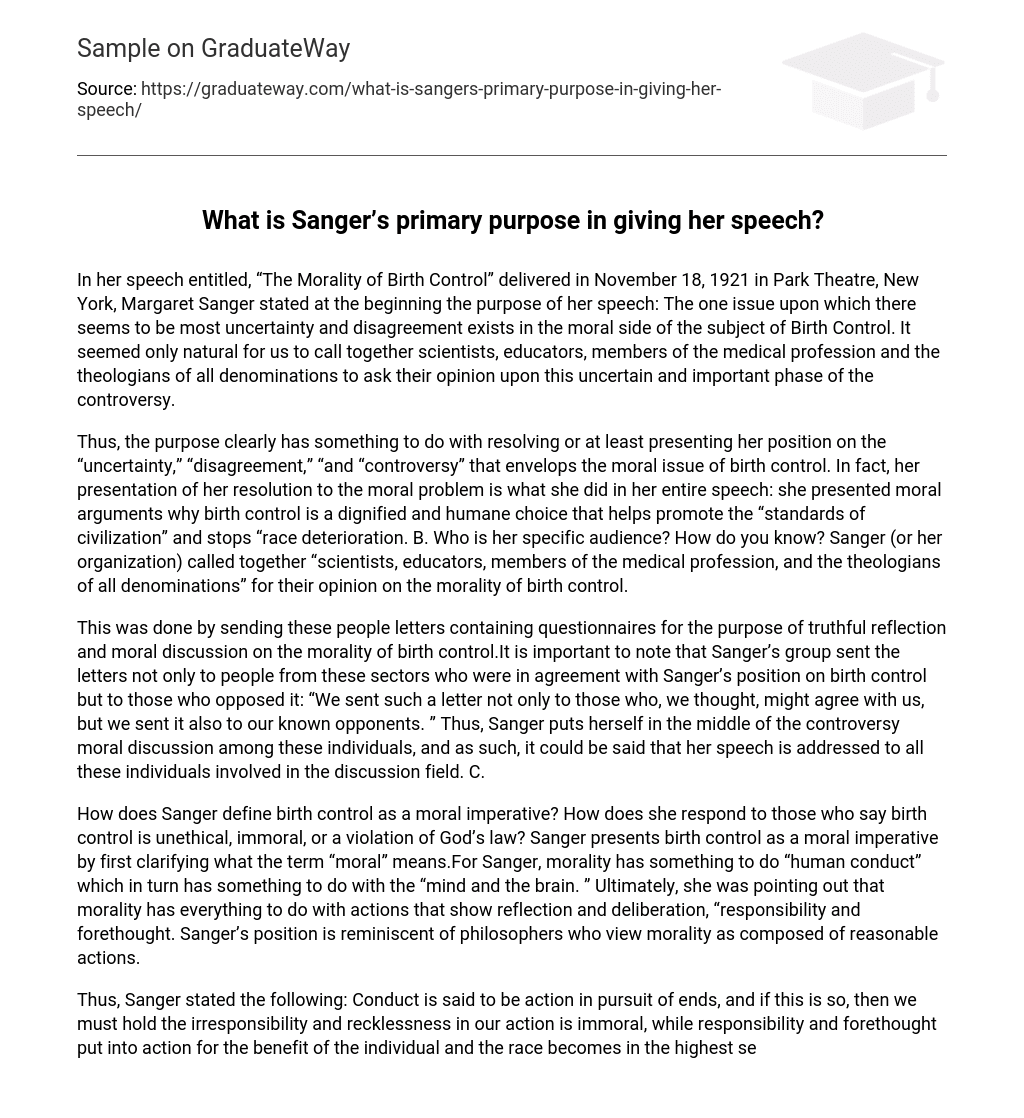In her speech entitled, “The Morality of Birth Control” delivered in November 18, 1921 in Park Theatre, New York, Margaret Sanger stated at the beginning the purpose of her speech: The one issue upon which there seems to be most uncertainty and disagreement exists in the moral side of the subject of Birth Control. It seemed only natural for us to call together scientists, educators, members of the medical profession and the theologians of all denominations to ask their opinion upon this uncertain and important phase of the controversy.
Thus, the purpose clearly has something to do with resolving or at least presenting her position on the “uncertainty,” “disagreement,” “and “controversy” that envelops the moral issue of birth control. In fact, her presentation of her resolution to the moral problem is what she did in her entire speech: she presented moral arguments why birth control is a dignified and humane choice that helps promote the “standards of civilization” and stops “race deterioration. B. Who is her specific audience? How do you know? Sanger (or her organization) called together “scientists, educators, members of the medical profession, and the theologians of all denominations” for their opinion on the morality of birth control.
This was done by sending these people letters containing questionnaires for the purpose of truthful reflection and moral discussion on the morality of birth control.It is important to note that Sanger’s group sent the letters not only to people from these sectors who were in agreement with Sanger’s position on birth control but to those who opposed it: “We sent such a letter not only to those who, we thought, might agree with us, but we sent it also to our known opponents. ” Thus, Sanger puts herself in the middle of the controversy moral discussion among these individuals, and as such, it could be said that her speech is addressed to all these individuals involved in the discussion field. C.
How does Sanger define birth control as a moral imperative? How does she respond to those who say birth control is unethical, immoral, or a violation of God’s law? Sanger presents birth control as a moral imperative by first clarifying what the term “moral” means.For Sanger, morality has something to do “human conduct” which in turn has something to do with the “mind and the brain. ” Ultimately, she was pointing out that morality has everything to do with actions that show reflection and deliberation, “responsibility and forethought. Sanger’s position is reminiscent of philosophers who view morality as composed of reasonable actions.
Thus, Sanger stated the following: Conduct is said to be action in pursuit of ends, and if this is so, then we must hold the irresponsibility and recklessness in our action is immoral, while responsibility and forethought put into action for the benefit of the individual and the race becomes in the highest sense the finest kind of morality. Sanger then goes on to demonstrate that birth control is a moral choice, as opposed to no birth control.First, she argues that giving men and women the birth control option is tantamount to allowing them to choose and to act with knowledge, and thus, to act reflectively and responsibly. It points to child-bearing more as a choice than an imposition, a decision on the part of the woman regarding her body.
Thus, child-bearing being an action filled with choice and knowledge, it becomes a responsible choice among men and women, and not a product of rashness, recklessness, or ignorance.Second, Sanger presents birth control as the only humane option for the civilized human race to curb population. Along with the “high standards of life” that human beings have attained comes the humane and sophisticated birth control method to curb the population. This is in direct contrast to the more primitive methods of “infanticide, exposure of infants, the abandonment of children, and abortion.
Through birth control, not only is population curbed; it makes the achievement and the maintenance of a standard of life (such as the life enjoyed by the intelligent, the wealthy, and the responsible) possible. As such, anyone who says that birth control is unethical, immoral, or a violation of God’s law is simply being unreflective of the human being’s dignity and capacity to choose. These people may also be charged of being unappreciative of the benefits that a moral life (that is, a reflective, knowledgeable, and choice-filled life) may bring (such as quality life or high standard of living).





